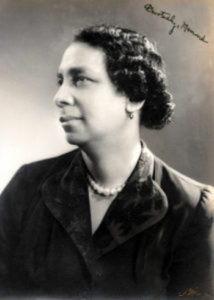
Lillie M. Jackson
Lillie M. Carroll Jackson, a Black director of the Maryland NAACP, was born on this date in 1889
Born in Baltimore, MD., she was the seventh of eight children born to Charles Henry and Amanda Bowen Carroll. Her father was Methodist minister Charles Henry Carroll. She was educated in Baltimore's Colored High School and graduated in 1908. After high school, she taught in the Baltimore school system for Black students.
She met her husband, Keiffer Jackson, while singing soprano in the Sharp Street Baptist Church choir, and they were married in 1910. She traveled with him, singing and lecturing while he showed his films to church groups. After the birth of their first child, Virginia, the Jacksons returned to Baltimore.
According to family lore, Jackson's commitment to fighting segregation began with a medical crisis in 1918. Before emergency surgery for mastoiditis, she prayed to God to spare her life so she might raise her children. In return, she vowed a lifetime of service. After the surgery, the doctor told her that he had removed more decayed bone from her head than he thought possible for her to survive. Despite the disfigurement of her face by the surgery, Jackson kept her promise. In Baltimore, she gave birth to Juanita, Virginia, and her only son, Bowen Keiffer.
As a successful businesswoman with rental properties, Jackson had the financial independence and time to commit to serving. She became the first woman to serve on the board of trustees for the Sharp Street Memorial Methodist Episcopal Church and then sponsored the City-Wide Young Peoples Forum.
In 1935, she accepted an invitation to revive the local NAACP chapter. She was its president until 1970, during which time she built the organization to a peak membership of 17,600. Despite the threat of violence that had kept Jim Crow in place, she brought steady pressure against segregation. Known as "Mother of Freedom" and "that NAACP lady” by her opponents, she led the Baltimore branch in picketing one “Whites-Only” theater for six straight years before the management gave in.
Known as the "mistress of the gavel,” She was unanimously re-elected president of the Baltimore branch of the NAACP each year during her tenure. As organizer and president of the Maryland State Conference of NAACP branches, she was elected to the National Board of Directors in 1948. With the support of the churches and the Baltimore Afro-American newspaper, the branch became one of the largest and strongest in the nation. She traveled the counties of Maryland, organizing branches of the NAACP until a network of units was established across the state.
These units united in a vigorous campaign for justice at the state level. Jackson's goal was "To help secure freedom and justice under the law.” The Baltimore branch initiated history-making legal cases that challenged the constitutionality of segregation in education, employment, and public accommodations. Among other achievements during this time, Jackson helped instigate the legal challenges to Jim Crow in Maryland. The NAACP special counsel brought a suit to desegregate the University of Maryland School of Law. Under her presidency, the local NAACP got the city to put Black police officers in uniforms for the first time. Public pools, parks, and civil service jobs were opened to Blacks.
Her daughter, Juanita Jackson Mitchell, also became an activist. She believed that the NAACP was "God's workshop," providing an arm of the church through which the people could actively work with Him to correct the injustices. "God helps those who help themselves," she would say. "If you sit down on God, you'll just sit," she warned.
Her daughter, Juanita, described her as a "freedom fighter." Whatever the label, Lillie Carroll Jackson played a pivotal role in the American Civil Rights movement in Maryland. Lillie M. Carroll Jackson died in 1975.
Black Women in America: An Historical Encyclopedia
Volumes 1 and 2, edited by Darlene Clark Hine
Copyright 1993, Carlson Publishing Inc., Brooklyn, New York
ISBN 0-926019-61-9